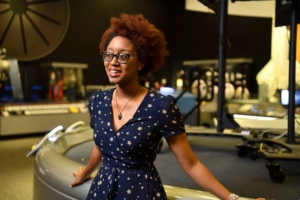Johns Hopkins PhD candidate creates resource list to help underrepresented minority and low-income students in STEM
This past spring at the Lunar and Planetary Science Conference in Houston, Lavontria Miché Aaron, a second-year PhD candidate studying Martian remote sensing and in-situ spectroscopy at Johns Hopkins University, tweeted that she had resources for underrepresented minority undergraduates who were interested in applying to graduate school. The tweet, which has been retweeted over 1,800 times and liked over 2,400 times, resulted in the creation of a comprehensive list of resources, including fellowships, scholarships, internships, GRE vouchers, free tutoring, and more for students interested in STEM graduate programs.
“Applying to graduate school is expensive! You need to pay to take the GRE and hire tutors,” explained Aaron. “A lot of this stuff I had to figure out myself or I was lucky enough to have someone tell me about it. Just because I struggled doesn’t mean that future potential graduate students have to struggle. I found the information and now I’m going to share it with people because it’s the right thing to do.”
Barriers to graduate school

Lavontria Miché Aaron, PhD candidate at Johns Hopkins University, created a list of resources for underrepresented minority students interested in graduate school. Credit: Will Kirk, Johns Hopkins University
Navigating the process of graduate school applications is a daunting task. Financial obstacles, such as paying for multiple graduate program application fees, GRE preparation courses, and the GRE test itself, make it even harder for underrepresented minority and low-income students trying to enter STEM fields. “I know grad school is supposed to be hard, but the financial aspects, such as doing quarterly taxes, negotiating salaries, and navigating health insurance benefits, makes it a lot more difficult, especially for underrepresented students,” emphasized Aaron. “
Money isn’t the only barrier; students often don’t have access to the same mentoring networks either. “A lot of students don’t even know they don’t have the right classes on their schedule,” said Aaron. Social obstacles can also stand in the way of students from entering STEM fields. “People don’t know how to network,” emphasized Aaron. “These are skill sets that are crucial for building relationships as a scientist or any field you want to get into.”
Speaking about her own experiences with applying to doctoral programs, Aaron credits the McNair Program, a post-baccalaureate program that mentors students while they apply to doctoral studies, with helping her. Even with this assistance, she still worked three other jobs, including a paint night instructor, to pay for GRE tutoring classes, extra classes at a community college to improve her graduate school application, and the GRE. “There were a lot of nights I had to catch up just to keep my head above water, and many students don’t even have the resources I had,” said Aaron.
Growing diversity in STEM
Aaron mentioned that Johns Hopkins has a committee that devises different ideas to make their departments more diverse, inclusive, and equitable, such as providing resources for underrepresented minority graduate students. “Everyone wants to feel equal, like they have a voice. We want our department to be diverse, inclusive, and equal among all students, faculty, and staff,” stated Aaron.
She also spoke hopefully about increasing diversity in STEM fields. “It’s definitely improving. Every time I go to a geology conference, I see a new batch of fresh faces and that’s really exciting, but there is always more that can be done. Discrimination still exists within the field and having a more diverse and inclusive community can mitigate that,” shared Aaron. “We’re all here doing the same thing. We all like studying these rocks whether on Earth or on Mars.”
As for the future of the list, Aaron hopes to eventually put it on a website with additional STEM resources, such as educational webinars in topics like physics, calculus, and chemistry. “I just want people to thrive. Grad school is hard enough, getting in shouldn’t be the hardest part.”
